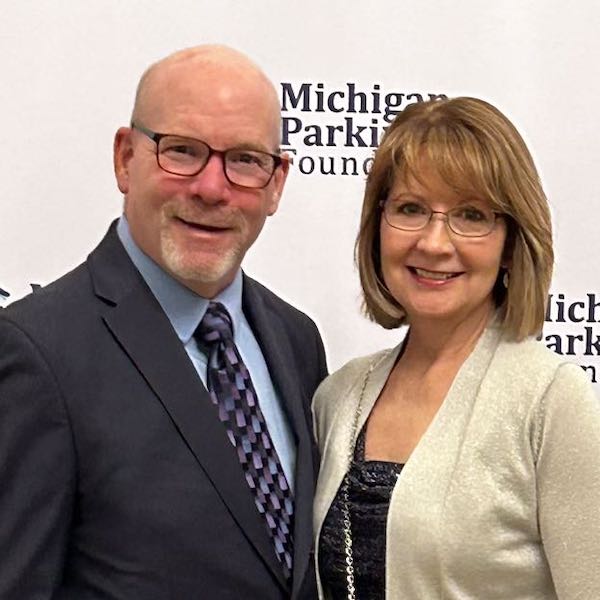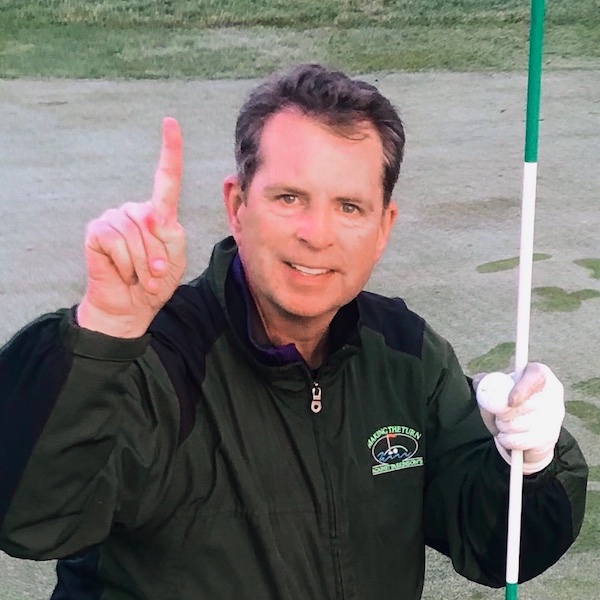If you would prefer to search for a mentor by phone, please call us at 248-433-1011.
(If you are having a medical emergency, please call 911.)
Steve Femminineo
I was diagnosed nearly 16 years ago, and although I have had some physical decline, I maintain a generally optimistic outlook for the future. Early on, I made the decision to take the initiative to find out how to live my best life moving forward with this disease. As an athlete, I was happy to discover that exercise was key to slowing the progression of the disease. I also learned early in this journey that everyone’s experience with this disease is different, and that I shouldn’t “borrow trouble,” by assuming that symptoms other PD patients experienced would ultimately be my fate as well.
I have had not one, but two DBS surgeries, so I can speak of that experience first hand. Also, as a facilitator of the PD SELF program (a fantastic program that teaches self efficacy tools to newly diagnosed people with PD and their care partners) in Detroit for 5 years, I feel that my experience with that program would be helpful to those folks who are overwhelmed by a new diagnosis.
Although I have had to hang up my hockey skates, I can still golf reasonably well, and still enjoy a vigorous bike ride. My nature photography hobby which used to include walking great distances, lugging heavy cameras with huge lenses, has transitioned to short walks carrying a single lightweight camera and a built in zoom lens.
I am blessed to have my incredible wife Rose as my care partner, and tremendous support from my friends and family. I don’t know for sure what the future holds (but then again who does?), but my faith allows me to face that future peacefully.
Contact Steve:
Steve Femminineo
Mentor for People with Parkinson's
Taylor, MI
Todd Gardner
But I’m only 43, I can’t have Parkinson’s.” That was my reaction when I was first told I likely had PD. It took another year of doctors to confirm that diagnosis.
I spent several years wrestling, bargaining, and finally accepting that I had this progressive disease. I had reached a crossroads of “now what?” Do I sit around feeling sorry for myself and let this disease consume me? Or do I take charge of my future and live my life to the fullest for as long as I can. Please read further to see how I came to terms with Parkinson’s Disease.
On a warm summer morning during one of my usual early Saturday morning rounds of golf at the Brookshire, I took an extra moment on the tee box, allowing all of my senses to take in the picture-perfect morning. Without warning, tears began streaming down my face. Although I had been diagnosed with Parkinson’s six years earlier, it wasn’t until this perfect moment in time that I was overcome with the reality that I have an incurable progressive disease which will someday likely rob me of moments like this and take away my ability to play the game that I love so much. This was the inspiration for the golf outing I host each year.
With help from my wife, Brenda, my daughter Madison, my Mom, my Dad, and many others along the way, our golf outing has grown into something far beyond anything I ever could have imagined. It has given me something positive on which to focus my time and energy. It has resulted in the formation of Making the Turn Against Parkinson’s and helped me find a voice I never knew I had. It has granted me peace of mind knowing I have a connection to golf despite what the future may hold for me. But most importantly, it has provided me the opportunity to make many new friends and meet a lifetime of interesting people I wouldn’t have otherwise.
To quote my own personal motto, “I cannot say being diagnosed with Parkinson’s has been a good thing. But I can say, good things have happened to me because I have Parkinson’s.”
Whether meeting on the course or by phone, I hope I by sharing my experience with Young Onset Parkinson’s and Deep Brain Stimulation surgery, I can help you better understand your own Parkinson’s journey.
Todd Gardner
Mentor for People with Parkinson's
Williamston, MI
Michigan Mentors Who Are on a Waitlist
Steve Femminineo
I was diagnosed nearly 16 years ago, and although I have had some physical decline, I maintain a generally optimistic outlook for the future. Early on, I made the decision to take the initiative to find out how to live my best life moving forward with this disease. As an athlete, I was happy to discover that exercise was key to slowing the progression of the disease. I also learned early in this journey that everyone’s experience with this disease is different, and that I shouldn’t “borrow trouble,” by assuming that symptoms other PD patients experienced would ultimately be my fate as well.
I have had not one, but two DBS surgeries, so I can speak of that experience first hand. Also, as a facilitator of the PD SELF program (a fantastic program that teaches self efficacy tools to newly diagnosed people with PD and their care partners) in Detroit for 5 years, I feel that my experience with that program would be helpful to those folks who are overwhelmed by a new diagnosis.
Although I have had to hang up my hockey skates, I can still golf reasonably well, and still enjoy a vigorous bike ride. My nature photography hobby which used to include walking great distances, lugging heavy cameras with huge lenses, has transitioned to short walks carrying a single lightweight camera and a built in zoom lens.
I am blessed to have my incredible wife Rose as my care partner, and tremendous support from my friends and family. I don’t know for sure what the future holds (but then again who does?), but my faith allows me to face that future peacefully.
Contact Steve:
Steve Femminineo
Mentor for People with Parkinson's
Taylor, MI
Todd Gardner
But I’m only 43, I can’t have Parkinson’s.” That was my reaction when I was first told I likely had PD. It took another year of doctors to confirm that diagnosis.
I spent several years wrestling, bargaining, and finally accepting that I had this progressive disease. I had reached a crossroads of “now what?” Do I sit around feeling sorry for myself and let this disease consume me? Or do I take charge of my future and live my life to the fullest for as long as I can. Please read further to see how I came to terms with Parkinson’s Disease.
On a warm summer morning during one of my usual early Saturday morning rounds of golf at the Brookshire, I took an extra moment on the tee box, allowing all of my senses to take in the picture-perfect morning. Without warning, tears began streaming down my face. Although I had been diagnosed with Parkinson’s six years earlier, it wasn’t until this perfect moment in time that I was overcome with the reality that I have an incurable progressive disease which will someday likely rob me of moments like this and take away my ability to play the game that I love so much. This was the inspiration for the golf outing I host each year.
With help from my wife, Brenda, my daughter Madison, my Mom, my Dad, and many others along the way, our golf outing has grown into something far beyond anything I ever could have imagined. It has given me something positive on which to focus my time and energy. It has resulted in the formation of Making the Turn Against Parkinson’s and helped me find a voice I never knew I had. It has granted me peace of mind knowing I have a connection to golf despite what the future may hold for me. But most importantly, it has provided me the opportunity to make many new friends and meet a lifetime of interesting people I wouldn’t have otherwise.
To quote my own personal motto, “I cannot say being diagnosed with Parkinson’s has been a good thing. But I can say, good things have happened to me because I have Parkinson’s.”
Whether meeting on the course or by phone, I hope I by sharing my experience with Young Onset Parkinson’s and Deep Brain Stimulation surgery, I can help you better understand your own Parkinson’s journey.
Todd Gardner
Mentor for People with Parkinson's
Williamston, MI
The Mentor Program is generously supported by:



